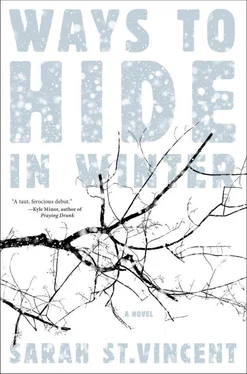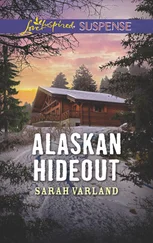“Puh! The doctor. What does he know?” She took a bite of cake and chewed, closing her eyes. “All I know is that it’s coming. Which is why I’m telling you. So you know.”
“Grandma,” I said. “Don’t talk like that.”
She opened her eyes and lifted her chin regally. “I’m telling you,” she repeated, “because I want you to be ready.”
I glared back at her, a knot of anger and dread growing in my stomach.
“There’s no way to be ready for things like that,” I said, barely managing to refrain from adding the obvious: and I should know.
“Yes, there is.”
I looked down at my plate with its slab of cake oozing caramel. Her breath was still ragged; I could hear it. The record player had at last spun itself into silence, and a car could be heard passing by outside the house. There was an old mansion on the mountain, to the east of the park, from whose enormous stone porch it was possible to look out over the entire valley. For a moment, I imagined how we must appear from that great distance: just a point of light, far away, surrounded by shadowed stretches of field and clusters of trees like inkblots. To anyone sitting up there, we would be invisible, she and I, as we sat here at the table under our single bulb, facing each other without speaking. Like prisoners.
“All right, Grandma.” I reached for her empty milk glass and stood, taking my own plate in my hands. My head had begun to ache again, just as it had that morning.
She looked up at me, trying to read my expression with her clouded eyes. I ignored her and continued clearing the table, wrapping up the remainder of the cake and sliding it into the refrigerator. When I had finished washing the dishes, I wiped the floor with hot water and rearranged the utensils and knickknacks on the counter, leaving everything spotless the way I always did.
Mounting the stairs in the dark, I entered my room and closed the door without turning the light on, stripping quickly and pulling on sweatpants and an old T-shirt before sliding under the blankets on the mattress on the floor. The blinds were raised, and a mist of light rain coated the window. I rubbed my eyes and lay quietly in the darkness for a while before reaching under the mattress and pulling out the brown packet, the one Jerry had given me. Shaking two of the pills into my hand, I swallowed them quickly. It seemed as though I watched the moon pass across the sky for a long time, thinking about lonely, silent tents in the mountains of Afghanistan, before falling asleep.
The days passed, much like most other days save for the continuing presence of the stranger. Sitting across the counter, he would fold his hands almost primly as he chatted about the weather, stories in the newspaper, Raskolnikov the killer and his unthinkable deed. I would offer him something to eat, but he always refused—out of pride, I suspected; maybe he sensed that I knew about his dwindling funds. As he spoke, sometimes he would forget himself and begin to gesture, his hands swanning through the air, not seeming to mind that my responses were largely limited to nods and neutral murmurs. He always kept his dignity, somehow, and yet I had never in my life seen anyone who looked so singularly out of place. Perhaps he knew this; there was something in his words, a wistfulness, a hint of irony behind the smiles, that made me think he did.
When he wasn’t at the store, he seemed to spend most of his time in his room, although a few times I spotted him outside, leaning against the hostel with his hands in his pockets, apparently gazing at nothing in particular. He didn’t look bored, but neither did he look as if he were actively contemplating the principles of modern forestry.
“What are you looking at when you stand around like that?” I asked one day when he came in.
“What do you mean?”
“When you just lounge around up there. I can’t tell if you’re half asleep or if you just find empty space particularly captivating.”
He laughed. “Well, at first I was waiting to see if there was a bus that came through here. Then I realized there was no bus. Now I just sort of think about things.”
“A bus?” I looked at him in disbelief. “Do you understand where you are?”
“I certainly understand it now. I don’t mind—I was just curious.”
“Well, let me satisfy your curiosity. You are, certifiably, in the middle of nowhere. Nothing comes in and nothing goes out.”
“Yes,” he said. “I can see that. I suppose in some ways it’s good—it helps to maintain the peace and quiet.”
He rubbed his fingers together and blew on them. I looked him up and down.
“Do you need a ride somewhere?” I asked finally.
He paused. “No,” he said at last, with his usual courtesy. “I couldn’t ask you to do that. Besides, it would cut my holiday short. I’ve really only just settled in.”
I peered at him, tempted to ask why someone who was supposedly waiting for a bus would want to settle in, but held my tongue.
It was a few days later that I arrived at work early and was horrified to find him attempting to chop wood.
The rain had eroded the snow, leaving only small, ice-encrusted patches scattered around the grass. He had propped a log on the old stump Martin used for such purposes and was standing with his back to me, holding a heavy axe in his hand. After a moment of scrutinizing the log, he raised the axe above his head, his back bending, and swung it down sharply. I cringed and watched the blade bounce off the wood, sending reverberations shuddering through his arms. The scarf was drawn tightly across his face, and he rubbed his forehead, examining the head of the axe. A minute later, he began to lift it again, his shoes sinking into the mud.
“No!” I called sharply, beginning to mount the hill behind him. “Don’t.”
He turned, surprised. Sweat shone on his brow, and his cheeks were flushed. “Oh! Hello.” His voice was muffled by the tattered fabric.
“You’re going to hurt yourself.” I reached the place where he was standing and looked around, seeing a large pile of logs but no tools aside from the axe. “Where’s the maul?”
“The what?” Even when he was short of breath, his words were carefully shaped, like the small carvings of birds my grandfather had once made.
“The maul, city boy. It’s like a big mallet.”
I was using words he didn’t know. He squinted slightly, looking to the side. “I’m afraid I’m not sure.”
“Martin should have given it to you. I’m assuming he’s the one who told you to do this.” I began marching toward the hostel, the puzzled stranger following behind me.
“Well, he didn’t order me, if that’s what you mean. I asked if there was anything I could do, and he said I could do this.”
“I don’t care what he said—you can’t use the axe.”
I strode toward a closet in the reception area, rummaging through the rakes and shovels inside. The maul was at the back, its wooden handle streaked with tar from some unknown source. I pulled it out and found a wedge on a high shelf.
The stranger took the tools from me, looking as if he were trying not to seem confused. I closed the door.
“You’re right, you know,” he said as we returned to the stump. “About my being a city person. I’m from Tashkent, the capital. We have electric heat. Electric everything. I’ve never done this in my life.” He pulled the scarf down. “I have to admit, it seems very primitive. I never knew people in America still heated buildings this way.”
“Well, Martin doesn’t really need this. It’s just for the fireplace. But yeah, there are some houses around here that still use woodstoves for their heat. Not so many anymore, although my grandmother’s place still does.” We stood facing the stump, and I took the wedge from his hands. “Here’s what you do. You work this thing into a crack, like this one you’ve already made”—I pointed—“and then you hit it with the maul. That’ll start to split the log, like you’re driving a chisel into it, and then you can use the axe to finish the job. Or you can just keep using the wedge.” I pushed the tip of the wedge into the crack and reached for the maul, gripping it and raising it above my head, swinging it down as hard as I could. The motion was difficult, but it worked. I had learned to make it work.
Читать дальше












